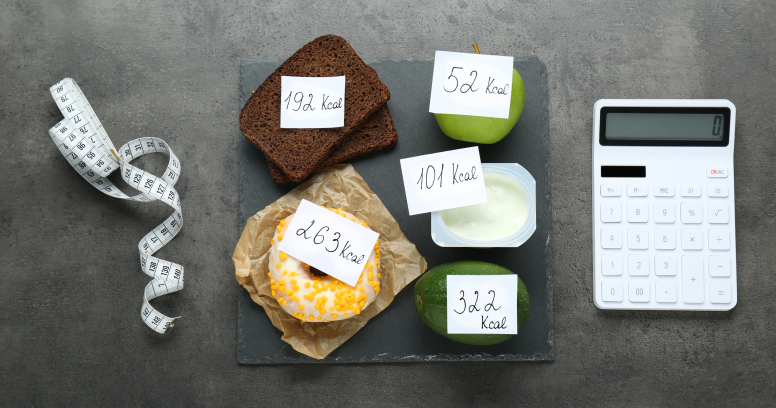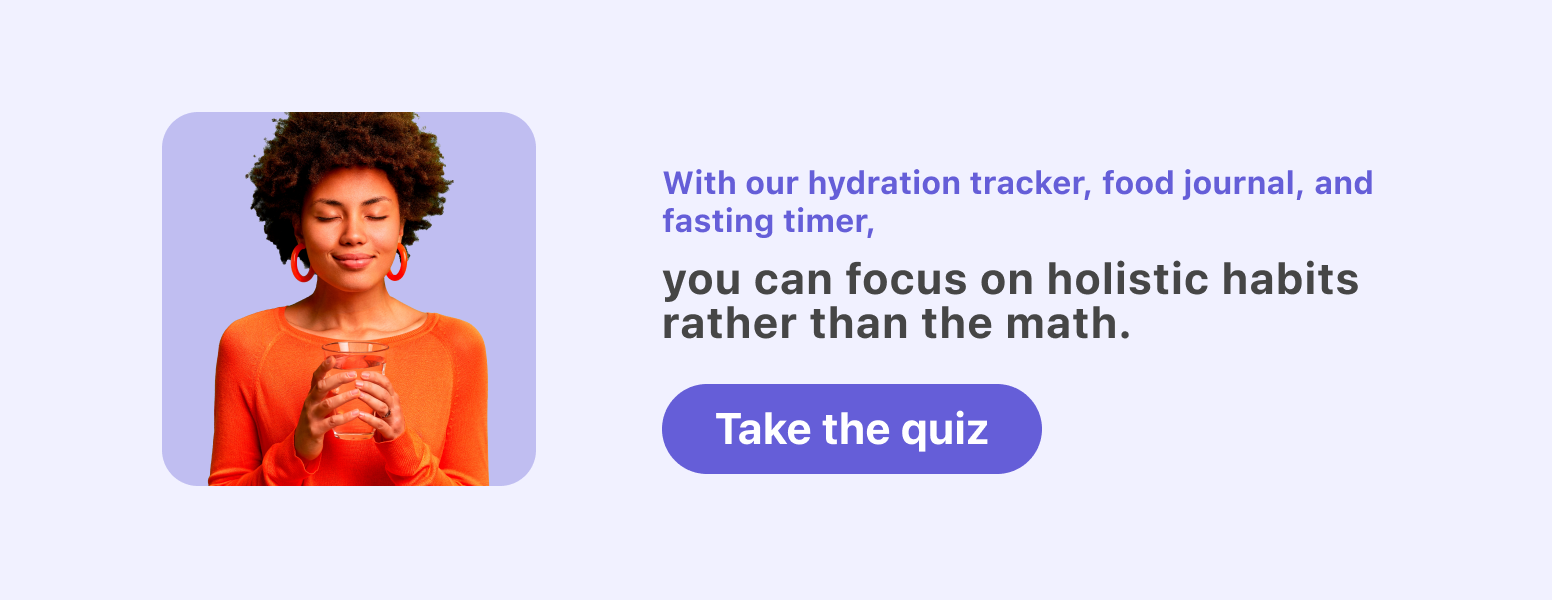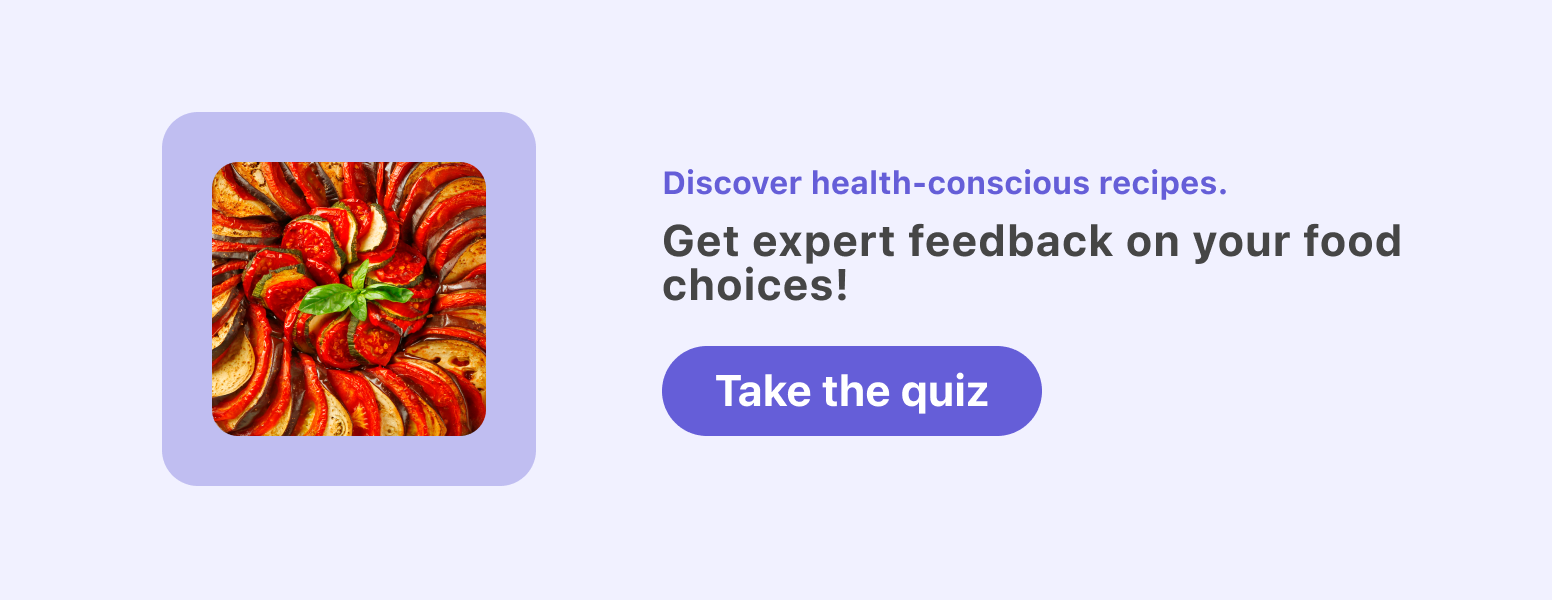How to lose weight without counting calories

Have you ever wondered: What’s the easiest way to lose weight? Or better yet, what is the easiest way to lose weight without “dieting” — in other words, without constantly counting calories and worrying about following a set of restrictive rules?

The tricky truth is that to lose weight, we have to eat less energy — aka fewer calories — than we burn. And, since most people underestimate how much they eat, we do have to be somewhat aware of how much we’re consuming.
But we don’t have to count calories to do it.
In this article, we’ll give you some lifestyle hacks to help you trim calories out of your daily menu. The best part? No complex calculations or counting required! Here’s the cheat sheet:
- Use smaller dishes.
- Eat slowly.
- Eat without distractions.
- Prioritize sleep.
- Eat more protein — especially earlier in the day.
- Skip a meal at the start or end of the day.
- Drink water regularly.
- Cook at home.
These simple strategies can make losing weight easier … and less of a math problem.
Ready to start your weight loss journey without the stress of counting calories? Let Simple be your guide. With our hydration tracker, food journal, and fasting timer, you can focus on holistic habits rather than the math. Start with our Simple quiz, and let the transformation begin!
Use smaller dishes
We use visual cues — like plate size — to decide how much is “enough.” And we often have habits about how we serve our food and drinks.
For example:
- Every time you make dinner, you use a big plate.
- Every time you get soup, you use a big bowl.
- Every time you order a coffee drink, you get a big cup.
The problem is dish sizes have grown.
Your dinner plate was yesterday’s serving platter. In the 1950s and ’60s, the standard dinner plate was 9 to 9 ½ inches in diameter. New dinner plates are 11 to 12 inches in diameter.
That may not seem like an enormous difference, but it can add up to far more food than you realize. An 11-inch plate (about 95 square inches) holds a whopping 31 square inches more food than a 9-inch plate (about 63 ½ square inches). And a 12-inch plate (113 square inches) nearly doubles the amount of food you can serve on it.
The same goes for drinks. For instance, cola was originally in 6.5 oz bottles. Now, it’s common to see 12-oz cans or even 16-oz bottles. The extra calories can add up.
But by using smaller dishes, you can trim calories naturally and easily.[1]
How to start doing this
Use smaller dishes.
Whether it’s plates, bowls, cups, or glasses … choose smaller ones. If you have baby spoons and forks lying around, try using smaller utensils too!
For example:
- Every time you make dinner, serve it on a dessert plate (about 7” to 9” in diameter).
- Every time you get soup, get a cup (4 oz) instead of a bowl (12 oz).
- Every time you order a coffee drink, get a small cup.
One of the easiest and healthiest ways to lose weight is to use a smaller plate, and you probably won’t even notice the difference.
(There’s one important exception: vegetables. Try including a larger portion of vegetables — for instance, letting them take up more plate real estate or having a larger salad before your main meal.)
Combine this with the next hack for what will feel like magic …

Eat slowly
If you slow down and chew your food more thoroughly, it can significantly reduce how much you eat — but you’ll feel more satisfied. Double bonus!
When you eat more slowly, pausing between bites and savoring tastes and textures, it gives your digestive system time to catch up and let you know it’s had enough.
Additionally, if you chew slowly and savor your food, odors from the food that drift up the back of your throat (aka retronasal olfaction) help give your brain additional information about what you’re eating.[2,3] This also improves your natural sense of fullness.
How to start doing this
Commit to a few mindful bites.
- Take a bite. Chew slowly, noticing how the food tastes.
- Put your utensils down.
- Take a deep breath. Relax your body.
- Count to 5 before you pick up your utensils again.
- Repeat.
Now, for the winning move … eat slowly while you …
Eat without distractions

Chances are, you move through your day on autopilot, even when you eat. Your phone, tablet, and television all take your focus away from your food. When you eat unconsciously, you hardly notice your food and eat significantly more than you would otherwise.
A 2013 American Journal of Clinical Nutrition review found that people who distract themselves eat more food.[4] The same distracted participants also ate more at later meals. And that can add up to an entire extra meal.
How to start doing this
Turn off your electronics and eat with full awareness.
- Start with just one meal and hold out as long as you can, even if that’s just 5 minutes without screens. (Yes, we know it’s horrifying to be alone with your own thoughts, but your waistline will thank you.)
Prioritize sleep
Sleep helps regulate our hormones — including the ones that control how hungry we feel.[5,6]
When we sleep well (and enough!), our appetite and hunger stay under control, and we get fewer cravings. But when we don’t sleep well or enough … we’re not only hungrier, grumpier, and crave-ier, we also lose good judgment and decision-making skills.
So, getting a good night’s sleep can help curb appetite.
How to start doing this
Help yourself wind down before bed.
- Commit to going to bed 15–30 minutes earlier. (Set an alarm to go to bed if you need one.)
- Do only activities that are calming in the hour before bed. (No shoot ‘em up video games!)
Eat more protein — especially earlier in the day
Protein can also affect your hunger and satiety hormone levels. Eating protein earlier in the day can help you feel satisfied all day and cut down on night-time snacking.
A 2005 study in the American Journal of Clinical Nutrition found increasing dietary protein by 30% caused participants to eat roughly 441 fewer calories per day, which led to significant weight loss.[7]
How to start doing this
Look for ways to add more high-protein foods, especially at breakfast and lunch.
- For example, try having eggs, Greek yogurt, tofu, or smoked salmon with your breakfast in addition to oatmeal or other complex carbohydrates.
Want help with food choices? Try our helpful assistant Avo, who can make suggestions for high-protein foods and recipes you’ll enjoy.
Drop a meal at the start or end of the day

A growing body of evidence suggests that intermittent fasting is as effective for weight loss as a traditional diet — but without calorie counting, restrictive food lists, and other stumbling blocks that can lead to failure.
A simple way to do this is to skip a meal at the start or end of your day — since you’ll be sleeping for several hours before or after that. That will mean fewer hours during which you could be consuming calories.
Now, this might seem like it contradicts the previous advice to eat protein earlier in the day, but “earlier” can mean lots of things.
For example:
- You could fast from 5 PM to 8 AM and break your fast with a “normally” timed breakfast.
- You could fast from 8 PM to 11 AM and break your fast later, but still get that protein first thing.
How to start doing this
Try the Simple fasting timer.
With the Simple app, you can define and track fasting times and experiment to discover what works for you. Plus, discover health-conscious recipes and get expert feedback on your food choices with our Nutrition Scores. Take our Simple quiz and start exploring all of the app’s features.
Drink water regularly
It’s common to sometimes mistake thirst for hunger, so you might think you need to eat when you’re really just thirsty. Drinking plenty of water can reduce the number of calories you consume, and you’ll effortlessly cut even more calories.
How to start doing this
Give yourself lots of cues and opportunities to drink.
- Keep an empty glass by your kitchen and bathroom sinks. Each time you pass those sinks, fill up the glass and drink.
- Keep a water bottle with you during the day.
- If you drink sweetened beverages, replace them with water.
Cook at home
Cooking for yourself has many benefits, but a crucial one is that it gives you control over what you eat.
You control the ingredients.
You control the portion size.
You — not some faceless food company or even your favorite restaurant — control every aspect of your food.
And controlling your meals can help you lose weight. Packaged processed foods are often high in calories and low in nutrients, and restaurant portions are frequently large enough to feed two. When you cook at home, you’re in charge of your nutrition. And you’re probably eating sensible portions unless you’re using restaurant-sized platters as plates.
How to start doing this
Look for small ways to prepare more food at home.
- If you like to cook, you’re already on your way. But if you’re new to cooking, pick one simple recipe to try each week. Find meals that you enjoy and that are easy to prepare. A boiled egg is a great start!
- You don’t have to cook full meals. Try prepping ingredients — for instance, soak whole grains overnight so they cook more quickly later. Or chop a few extra veggies when making a salad so you have them all set for tomorrow.
Yes. While you still have to find ways to eat less energy (aka fewer calories) than your body burns, you don’t have to count every calorie to do it.
There are alternative approaches that focus on healthier eating habits and lifestyle changes.
Focus on non-scale victories and daily-life behaviors like having more energy, getting better sleep, having a better mood, and being more active.
You can also track your body measurements or take progress photos.

- Jayawardena R, Swarnamali H, Ranasinghe P, Hills AP. Impact of portion-control plates (PCP) on weight reduction: A systematic review and meta-analysis of intervention studies. Obes Res Clin Pract. 2021 Feb 13;15(2):106–13.
- Ruijschop RMAJ, Boelrijk AEM, de Graaf C, Westerterp-Plantenga MS. Retronasal aroma release and satiation: A review. J Agric Food Chem. 2009 Nov 11;57(21):9888–94.
- Jovanovic P, Riera CE. Olfactory system and energy metabolism: A two-way street. Trends Endocrinol Metab. 2022 Apr;33(4):281–91.
- Robinson E, Aveyard P, Daley A, Jolly K, Lewis A, Lycett D, et al. Eating attentively: A systematic review and meta-analysis of the effect of food intake memory and awareness on eating. Am J Clin Nutr. 2013 Apr;97(4):728–42.
- Liu S, Wang X, Zheng Q, Gao L, Sun Q. Sleep deprivation and central appetite regulation. Nutrients. 2022 Dec 7;14(24).
- Lin J, Jiang Y, Wang G, Meng M, Zhu Q, Mei H, et al. Associations of short sleep duration with appetite-regulating hormones and adipokines: A systematic review and meta-analysis. Obes Rev. 2020 Nov;21(11):e13051.
- Weigle DS, Breen PA, Matthys CC, Callahan HS, Meeuws KE, Burden VR, et al. A high-protein diet induces sustained reductions in appetite, ad libitum caloric intake, and body weight despite compensatory changes in diurnal plasma leptin and ghrelin concentrations. Am J Clin Nutr. 2005 Jul;82(1):41–8.
